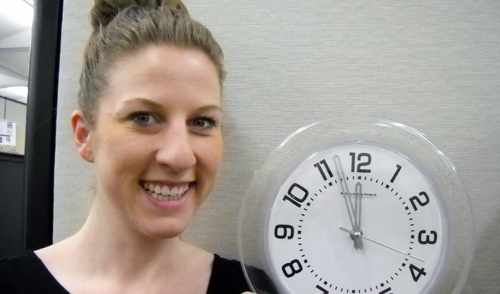
Hannah McGregor likes using lots of words. But she’ll have to find fewer and probably shorter words to describe her doctoral studies in literature if she hopes to beat the clock in Guelph’s inaugural Three-Minute Thesis (3MT) contest.
The PhD student in the School of English and Theatre Studies (SETS) will be among 60 grad students from across campus vying in this month’s contest to explain their work in three minutes or less. Top finishers in preliminary “heats” will move on to University-wide finals this month and have a chance to represent Guelph at the first-ever provincial 3MT finals in April.
“This is an excellent opportunity for students to showcase their research to a wider audience, improve their oral presentation skills and build excitement for research happening at Guelph,” says event organizer Lindsey Robinson, administrative assistant in the Office of Graduate Studies.
Her office is running the contest at Guelph. Other Ontario universities are holding similar events for the first time this year, she says. “The idea is to make your research understandable for everyone.”
During three days of preliminary rounds, students will speak before a judging panel of faculty and staff members and U of G administrators. The top three contestants from each heat will compete at University-wide finals.
From there, the top two U of G finalists will compete at a provincial contest to be held in April at Queen’s University.
U of G heats and finals are open to audience members from the University community and the general public.
The event will give U of G members a quick look at often-complex topics under study across campus, says Robinson. It will also help grad students prepare for their eventual thesis defences and for subsequent employment interviews.
“The 3MT competition presents the challenge for students to speak to their research while using their presentation skills and personality and to have others share in their advancements – not to mention great prizes.”
The top Guelph contestant will win $1,000. The runner-up will receive $500; third place, $250. Prizes are to be paid against tuition.
The contest has drawn students from all seven of U of G’s colleges.
McGregor from SETS will talk about how novels, memoirs and poetry set abroad shape Canadian readers’ views of other parts of the world. Her research draws upon numerous works, including The Disappeared by novelist Kim Echlin and Karen Connelly’s Burmese Lessons.
She says publicly-funded researchers should explain their work and its importance to wider audiences – although doing that while sparing words can present challenges, especially in her discipline.
“This is working against my instincts. I’d rather use more words – and words with seven or eight syllables,” says McGregor, who is a doctoral fellow in U of G’s TransCanada Institute.
Kathryn Walton, a master’s student in the Department of Family Relations and Applied Nutrition, will discuss parental stress and childhood obesity. Researchers know parental stress affects relations with children, but they know less about how it affects weight gain in youngsters. They hope to find ways to promote healthy eating habits and behaviours, especially among preschoolers.
“This is a new area of research,” says Walton, an applied nutrition grad from Guelph.
For his master’s studies in the School of Environmental Sciences, Paddy McManus is studying a new insecticide for mosquitoes that spread West Nile virus, dengue fever and malaria.
He hopes the contest will help him find more concise ways to explain his work. “My master’s thesis is about 300 pages so far. I was really interested to see if I could tell a logical story of my research and its findings in such a short period of time. One minute per 100 pages of text sounds pretty action-packed.”
Earlier this month, Guelph’s Department of Pathobiology held its own Three-Minute Thesis contest. That event was launched last year after Prof. John Prescott saw a similar contest at the University of Melbourne.
“It’s a good way to get people to explain what they’re doing in a very short time, it’s competitive, there’s money involved,” says Prescott.
Fourteen pathobiology grad students discussed their work in early March.
Brian Stevens, a D.V.Sc. student, won for his discussion of mammary cancer in dogs. He began his talk with a line that he uses with most listeners, including his family: “I stare at boobs all day.”
Says Stevens: “It’s a good opportunity to practise your presentation skills. It’s fun to try and summarize a research project that is difficult to explain.”
Among master’s students, Christian Ternamian won for a talk on viral therapy for treating cancer.
Maureen Anderson won in the doctoral category for her talk on hand hygiene for preventing disease spread. Along with Prof. Scott Weese, she runs the “Worms and Germs” blog.
She says the contest is a fun way for students to learn from each other. “You don’t have to sit through a one-hour defence. You get the snapshot of what everybody’s doing.”
U of G’s 3MT heats will take place March 19 in Science Complex 1511; March 20 in Richards 2520; and March 21 in Library Learning Commons 1714. All three events will start at 10 a.m.
Guelph finals will take place March 22 at 2 p.m. in Richards 2520. Provincial finals will take place April 18 at Queen’s University.